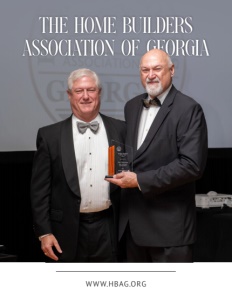The Home Builders Association of Georgia
Constructing the Best Direction for its Valued Members
The Georgia State Home Builders Association plays a crucial role in advocating for the state’s home builders, focusing on advocacy and workforce development.
The Home Builders Association of Georgia (HBAG) is a trade organization committed to safeguarding an environment conducive to the ongoing success of affordable and sustainable housing in Georgia, benefiting both its dedicated members and the broader community.
With a multi-tiered federation structure, HBAG collaborates with local associations, while maintaining its affiliation with the National Association of Home Builders (NAHB). This enables the organization to effectively address regulatory and policy issues and provide representation for the housing industry at every level of government.
By championing advocacy, offering educational programs, and recognizing the exemplary service of its members, HBAG plays a pivotal role in advancing the home-building industry and ensuring that quality, affordable housing remains accessible to all.

Austin Hackney, Executive Vice President
Executive Vice President, Austin Hackney simplifies the structure of the organization, sharing,
“A home builder would join their local homebuilder’s association, we have 22 around the state of Georgia, and they’d automatically be a member of our statewide organization, and our National Association of Homebuilders.” Representing builders, remodelers, and various industry associates, including realtors, mortgage bankers, and subcontractors, the role of HBAG is primarily advocacy at the state level.
“Our mission statement is that we’re dedicated to creating, promoting, and protecting an ongoing successful environment for affordable and sustainable housing to benefit our members and the citizens of Georgia,” Hackney relays.
“We use the collective voices of our members to hopefully promote affordable housing in the state. We do that through regulatory and legislative reform or other instances where our builders interact with different levels of government. We are committed to providing opportunities for our members to improve their businesses, to get involved in their communities, to advocate for themselves for affordable and quality housing in their communities.”
Key Priorities for 2024
Sharing the association’s legislative priorities for the upcoming year, Cindy Morley, Director of Public Affairs relays that material pricing and availability, workforce development, state licensing, local permitting costs, and local residential design standards are the top five issues of focus. “Of course, it all centers around housing access and affordability,” she maintains.

Cindy Morley, Director of Public Affairs
In addition to their legislative efforts, Morley says the association also participates in various Senate and House committees during the off-session. One notable committee is the Senate Committee on Occupational Licensing, which hopes to influence state licensing policies to better serve its members and the housing industry.
Furthermore, she shares that the Home Builders Association of Georgia remains focused on workforce development, collaborating with committees and organizations aimed at expanding the skilled labor force in Georgia. Another significant initiative is their participation in the Housing Access and Affordability Task Force, a collaborative effort that brings together a diverse range of groups, including the Georgia Association of Realtors, the Georgia Chamber of Commerce, Habitat for Humanity, the Association of County Commissioners, and the Georgia Municipal Association.
“That’s what we’re doing in the off session right now, to try to be prepared when the session begins,” she relays.
Increasing the Housing Supply to Support Affordability
The state’s housing market has experienced a shortage of available housing, causing a substantial increase in housing prices. “We look at increasing the supply, which we’re very short of in the state of Georgia, as a way to promote affordable housing. As people move up into their next home, they release more of that supply into the marketplace,” Hackney explains. “So, when we talk about affordable housing, sometimes we just mean attainable market-rate housing, that’s not more expensive than it needs to be.”
Named the “Number One State to Do Business In”, 10 years in a row, Georgia has continued to attract new residents, which is a blessing and a challenge for the industry. “All those new people mean new homes are needed, and our members have just been trying to play catch up since the great recession,” Hackney portrays.

Alan Cannon, President
Although Metro Atlanta serves as Georgia’s economic hub, attracting many newcomers to the state, Hackney acknowledges that the Governor’s administration has intentionally directed economic development efforts outside the metro area, with a particular focus on rural regions. This approach has led to substantial economic development projects in these areas, and the need for additional housing options has become increasingly apparent.
“When the Hyundai plant in Bryan County brings more than 8000 jobs that didn’t exist there previously, all those jobs need a place to sleep at night,” expresses Hackney.
Sustainability Vs. Affordability
The association’s members are addressing challenges related to sustainability, such as electric vehicle (EV) and solar panel mandates. “We’ve been actively involved in committees and hearings on both EV and solar panels,” recounts. Morley
“Because in the long run, it does add to the cost of the house, and right now as we’re struggling to find that missing middle, we’re looking for ways to build houses, especially starter homes that people can afford. But when we start adding costs on requiring EV connections and other mandates in every house, that adds to the cost.”
One of the significant sustainability achievements in recent years is Georgia’s focus on energy efficiency through the International Energy Conservation Code. “This is a mandatory rulebook for all home builders in the state to follow. It gets updated regularly with new products and new requirements for these energy efficiencies,” Hackney conveys.
This means that all new homes in Georgia are built to high energy efficiency standards, which include insulation, air exchangers, and other components. This ensures that new homes in the state are more energy-efficient and environmentally friendly “And certainly plenty of our homebuilder members go over and above those minimum standards for even higher efficiency levels,” he asserts.
Attracting a Skilled Workforce

Franklin Bailey, 1st Vice President
Addressing workforce development is another top priority for HBAG. Morley highlights the association’s strong support for funding apprenticeships and on-the-job training, aiming to nurture a skilled workforce for the industry. She underscores the significance of dual enrollment programs, stating, “A lot of the people that go into the skills trades go through dual enrollment in high school, which allows them to take courses in the technical college that gives them certification in our field. So, not only are they earning their high school diploma, but when they come out, they are ready to go to work. That gives us experienced workers, it allows them to go straight into the trades.”
Morley notes that Georgia has also taken steps to promote apprenticeships in high-demand fields, including construction, and allocated funding to create paid apprenticeships and internships for students, primarily through the Technical College System of Georgia. This investment enables students to enter the workforce early, earn a living, and often secure employment with companies once their apprenticeships conclude.
Future Plans and Initiatives
Discussing future initiatives, Hackney refers to a recent legislative session, where the Georgia state government initiated the creation of the Georgia Rural Workforce Housing Development Fund. With an allocation of $36.5 million, this fund is meant to support rural counties in Georgia with populations under 50,000. It provides grants to local governments, cities, counties, or private developers to help finance or offset the costs related to infrastructure development required for workforce housing projects.
“We are excited to see that program get implemented,” he asserts. “We’re looking forward to seeing how that money gets paid out, what kind of projects are funded through that program, and what kind of new incentives the state can provide to encourage workforce housing developments all across the state, especially in those areas near the economic development projects that need new housing. “
Morley suggests that although housing affordability is a priority, workforce development is also key. “We’re struggling in building a workforce, and we have got to find ways to get the students into the construction programs,” she stresses.
“We know that the state has made some investments in paid apprenticeships and dual enrollment, but we think more would be beneficial.” She says the government’s investment in these initiatives is promising, and legislative bodies in both the Senate and House are focusing on addressing the workforce challenges from an early age, which bodes well for the future of the industry in Georgia.
“All the schools here in Georgia have career tech programs. But those programs need funding to buy materials and pay for instructors so that we can get the students out of the classroom and into the field earlier. So, we are excited to see where that goes.”
AT A GLANCE
Home Builders Association of Georgia
What: A trade organization advocating for the home building industry in the state of Georgia
Where: Atlanta, Georgia
Website: www.hbag.org


